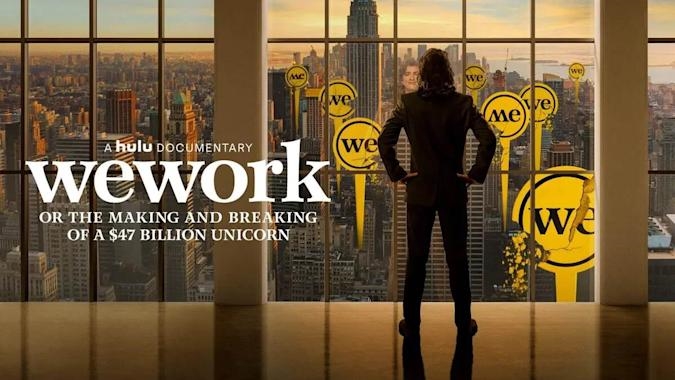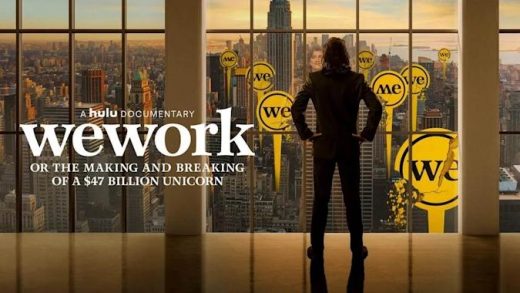‘WeCrashed’ on AppleTV+ promises the world, but delivers very little
Hulu’s WeWork documentary depicts the rise and fall of a cult
But it doesn’t feel as comprehensive or insightful as it could be.


I’ll be honest, I never paid much attention to WeWork during its insane rise and even madder implosion. Despite its founders swearing that it was a technology company, in reality it was just another office-lease firm. Unlike the slow-motion car-crash of Theranos, where I’d covered it enough to be on the receiving end of its jackbooted PR operation, I only knew the bullet points here. You know: The massive Softbank valuation, the Paltrow-adjacent yoga nonsense and the — my lawyers have advised me to use the word “interesting” — interesting way its co-founder did business. But however crazy I thought this story was, WeWork: Or, The Making and Breaking of a $47 Billion Unicorn shows it was much, much worse.
The film tells the story of WeWork, a New York coworking company co-founded by Miguel McKelvey and Adam Neumann. They both grew up in communal living spaces — a commune in Oregon for McKelvey and an Israeli kibbutz for Neumann. Their dream was outlined as a form of “capitalistic kibbutz,” which took the form of building a series of expensive and beautiful office spaces in New York City. These facilities were little more than shared, open-plan offices with free food and drink, but Neumann sold it as a new way of living. He wasn’t renting desks for freelancers, entrepreneurs, dreamers and startups — he was building “The We Community.” This wasn’t just Regus with better furniture. No, this would change the world.
If you’ve seen documentaries like Going Clear, The Inventor or Fyre: The Greatest Party That Never Happened, the beats of this movie will be familiar. There’s a supposedly charismatic individual who is able to convince people to buy in to their vision, no matter how off-kilter it is. Then people are put into ever-escalating situations to justify that first decision, first as triumph, then as farce. This may be the story of a business that reached a massively inflated valuation before reality struck, but it’s framed like a cult. During a panel at this week’s virtual South by Southwest conference, producer Ross Dinerstein — who also made HBO’s 2020 Heaven’s Gate: The Cult of Cults — sees lots of similarities. “People want to be inspired, people want to be motivated,” he explained, “and be a part of something bigger than the whole.” He added that “what Adam preached” resonated with him until “he grew this messianic complex, and the money became silly, and they lost their focus.”
One thing that Neumann was clearly good at was throwing a party, and WeWork became infamous for its summer-camp style retreats. Clearly, all the best cults involve pulling people from their normal social circle and dragging them to a remote location for further indoctrination. At one point, the event is described as “Fyre Festival done right,” with a big emphasis on the company’s drinking culture. A lot of the film features moments of people downing shots, hosting ragers at the office mini-bars in a way that seems unhealthy. The film neglects to mention the Wall Street Journal story that claims Neumann, after discussing mass layoffs as a cost-cutting measure, had tequila shots brought in for the employees to drink.
One of the things that I had missed was the broadening of the We-franchise beyond co-working spaces to include housing complexes. WeLive converted an office block into a series of “tiny living” apartments with foldaway Murphy beds and spartan furniture. The facilities are communal, and it’s clear that We’s drinking culture was embedded inside the living quarters, too. In order to sign up, early WeLive tenant August Urbish was asked to write an essay on why he wanted to live there. As people became embedded in the building, they found themselves becoming extraordinarily insular. At one point, Urbish says that he was going to a birthday party for someone who didn’t live in the building, and noticed people seemed to be recoiling in disgust.
Another venture that gets relatively short shrift in the film is WeGrow, the company’s education effort led by WeWork’s chief brand and impact officer — and Neumann’s wife — Rebekah. WeGrow was a New York-based private elementary school with a facility designed by Bjarke Ingels which, HuffPost reported, cost between $22,000 and $42,000 a year for tuition. The film makes this out to be little more than a punchline, something crafted to satisfy Rebekah Neumann’s apparent ego. Forgetting, of course, that such a venture was backed by someone else’s cash, and affected other people’s children. (Yes, it’s hard to feel sad that wealthy people were spending even wealthier people’s money, but the human element is lost).
A lot of these modern-day business failure documentaries often have holes in their center as they fail to grasp the motivations behind their lead characters. In part, this is because the Neumanns refused to contribute to a documentary which would likely paint them in a harsh light. But the filmmakers make a lot about praising Adam’s messianic, attractive personality, but that doesn’t come across here. In addition, the filmmakers seem convinced that Neumann is an ingenue with good intentions. “When we started this,” said producer Ross Dinerstein, “I thought that there would be federal charges, criminal indictments […] I went into this thinking he was a white-collar criminal, and he’s not.” Dinerstein added that he felt Neumann “played by the rules” and “people enabled him,” the same people who he felt could, or should, have intervened when things looked to be spiralling out of control.
The filmmakers said that they believe that the bigger issue is the nature of late-stage capitalism right now, which enables people like Neumann. After all, it only takes you to make one good bet, and you could be a major investor in the next trillion-dollar giant. They laid some of the blame at the feet of Masayoshi Son, the CEO of Softbank and head of the Vision Fund, which handed Neumann a $4 billion-plus check. Their point was to say that venture capital’s ability to bankroll money-losing businesses until they become behemoths is a bad thing. But this thesis isn’t clearly spelled out in the film itself, which looks to present WeWork’s valuation in glossy, 3D-numbers floating in air, Panic Room style, down sunny New York streets.
It’s frustrating because there seems to be a more sinister story lurking at the fringes of this film, and it’s a shame that it isn’t explored more. Former employees say that Neumann can get “anyone to do anything,” and he dismissively compares his personal assistant to a female employee walking past during a meeting. The moment when the summer camps are made mandatory, and employees are made to wear tracking bracelets seems off. Not to mention the limited mention of Neumann licensing the “We” trademark to his company for close to $6 million — which he subsequently paid back. Lip service, too, is paid to the reports that he was buying properties out of his own pocket just to lease back to WeWork.
I also found my brain itching at moments that were clearly edited out of the narrative to tell a cohesive story, at the expense of explanation. The story feels incomplete until you google some of the answers post-facto, like GreenDesk, and who funded WeWork’s initial facilities. Similarly, the business fundamentals of the company are glossed over until later on, when the amount of money it’s losing falls into stark focus. The film cuts together moments of Neumann potentially misrepresenting WeWork’s profitability but never with the weight the subject should be given.
During the panel, director Jed Rothstein said that he was “more interested in [Adam Neumann] when I finished making this, rather than less.” In a way, that’s a small indictment of his own film, which fails to really wrestle together a coherent portrait of Neumann. It’s something that several documentaries have struggled to achieve, and so I don’t blame Rothstein here. Especially given that the film was produced in the midst of a pandemic — the only clues being a hat-tip to everyone masking up at the end — which deserves praise. But for those faults, WeWork: Or, The Making and Breaking of a $47 Billion Unicorn remains essential viewing, even if it is a tad shallow. When you’ve finished it, the first thing you’ll do is start looking for a book or news article that can help you explore this moment of collective insanity even further.
Oh, and if you ever aspire to run your own business, don’t make your employees chant the company name. Or chant anything else, for that matter, because it’s a very clear red flag that footage of you is going to end up on a tell-all documentary between five and ten years later.
WeWork: Or, The Making and Breaking of a $47 Billion Unicorn premieres April 2nd, on Hulu.
(26)


